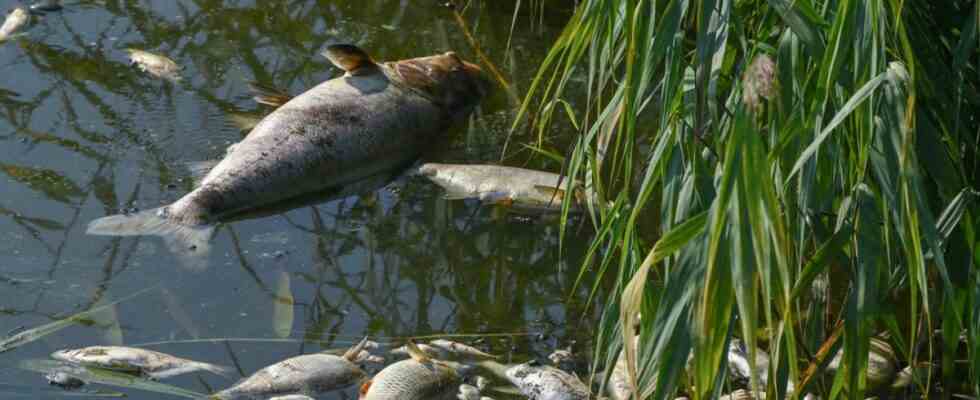In the end, a microscopic alga was the only thing that Polish and German authorities could agree on. The so-called golden algae spread explosively in the Oder this summer, report environmental experts on both sides. Their toxins would then have led to the biggest environmental catastrophe to date in the border river: hundreds of thousands of fish died in agony, and mussel species were wiped out. The images of the carcasses dominated the first weeks of August. But that was it with the similarities.
On Thursday, the Polish Institute for Environmental Protection IOŚ-PIB presented its final report on the mass death of fish, on Friday the German Federal Environment Agency presented its findings. The Polish researchers criticize the fundamentally poor condition of the river. The excessive salt content caused by industrial discharges, combined with the drought and high levels of solar radiation, led to the rapid spread of the algae. This is also what the German report says.
However, Federal Environment Minister Steffi Lemke (Greens) commented on this finding unequivocally: The pollution of the Oder “was caused by human activities, that is a central finding of the investigation”. The only thing that is unclear is where the salt came from. Exactly this question is also left unanswered by the Polish side. The researchers call for stronger monitoring of water quality. What was missing, however, was a clear statement from the ministry as to which companies were responsible for the pollutant discharge. So far, there has also been no commitment to reduce such discharges.
Originally it was planned that the expert groups of both countries would share their results and write a report together. Lemke and her Polish colleague Anna Moskwa set up the groups as a joint commission. “In the beginning, the cooperation was actually very cooperative,” says Christoph Schulte, who coordinated the investigation on the German side. But then the connection was “gradually torn off,” and in recent weeks there have been hardly any contacts with the Polish side. Finally, last Wednesday, it became known that the groups were publishing two different reports. The mood is so bad that not even a joint foreword is possible, he reports mirror.
“Something like this just happens in nature,” says the Polish site
The failure to work together on the final report was only the provisional culmination of a series of controversies between the two countries after masses of dead fish floated in the Oder on August 9th. At the time, both German and Polish local and opposition politicians accused the right-wing populist government in Warsaw of already knowing about the fish kill but not having informed them. Internationally required reports of such incidents have been omitted. Poland’s government then declared that it would check all discharges into the Oder and the permissions of the discharging companies. Shortly thereafter, the chairman of the Polish water authority reported that there were 282 illegal drains found and 57 reported to the police.
At least in the Upper Silesian Voivodeship, no irregularities were found, said Marshal Jakub Chełstowski at a press conference in Katowice at the end of September when asked by the Süddeutsche Zeitung. Upper Silesia with its coal mines and industrial plants is the industrial heart of Poland. Chełstowski, himself a member of the ruling PiS party, said the investigation was still ongoing. But “something like that just happens in nature.” Something similar was also observed in fish ponds during this hot summer. “You can’t win against nature.”
The search for the causes is also so difficult because the Oder is of great importance for Poland. It is the most important river in the country, and a lot of industry has settled on its banks, paper mills, copper mines, mining, some of which are state-owned. At the same time, the myth of the clean Oder is cultivated, and many Poles are hobby anglers. An environmental scandal could damage the ruling PiS party, the country is in the election campaign.
Parallel to the reports from German and Polish authorities, the environmental protection organization Greenpeace published its own extensive investigations into fish kills on Thursday. “These results indicate that the environmental disaster is largely man-made and is due to the heavy pollution of the river,” the report said. Marek Jozefiak, spokesman for Greenpeace Poland: “The problem is that in Poland the Oder was polluted because it was possible.”

